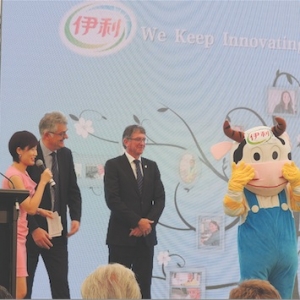The $236m plant at Glenavy, in the far south of Canterbury, was commissioned this spring and is set to expand dramatically over the next four years. A suite of developments was unveiled to coincide with the opening.
“We anticipate the first phase of the expansion project will commence in early 2015 and have scheduled the remaining phases through to completion in 2019,” said Oceania chief executive Aidan Johnstone.
Oceania expects to be handling at least 630m L of milk from local farms by the end of the expansion “generating export revenues in excess of $700m”.
This year Oceania will collect about 165m L from 48 suppliers, putting the plant at about 70% capacity in its first year. Johnstone told Rural News they expect to have “close to 60” suppliers next year providing a 25% increase in supply. “We have a list of interested farmers but we will always take more expressions of interest.”
If anything, a lower payout would push more milk to Oceania, rather than Fonterra, as there would be less capital available for cooperative shares, he suggested.
With regards to Fonterra’s plans to put two new dryers at Studholme (the pocket-sized plant acquired after Russian-owned New Zealand Dairies went into receivership) he said he thought Oceania’s developments – a second whole milk powder dryer, an infant formula canning line, and UHT liquid milk and lactoferrin facilities – would “probably precede” them. “But I think there’s plenty of milk in the region for us all,” he added.
Yili is calling the region, dominated by the Waitaki Valley and largely irrigated with water from the Waitaki River, “Milk Valley” reflecting its potential in their eyes. “Me and my colleagues call it the milk valley of the future,” company president Pan Gang said at the opening through an interpreter.
Gang stressed the contribution the Glenavy factory will make to the local economy and New Zealand’s tax take. “Yili Oceania is a great sign and leading symbol of the cooperation between New Zealand and China.”
Todd McLay, New Zealand’s Associate Minister for Trade, and Foreign Affairs, picked up the bilateral Kiwi-Chinese cooperation theme, saying the previous week’s visit by China’s president Xi Jinping “marked an auspicious time in China and New Zealand’s relations”.
McLay stressed two-way investment is “the key” in the relationship, rattling off examples of Chinese investment in New Zealand which now accounts for over half the total overseas investment coming into New Zealand.
Meanwhile New Zealand Government and business investment in China has increased by “over 10% in the past year,” he said, citing Fonterra’s $615m Beingmate joint venture and continued investment in farms in China.
Zhang Fan of China’s embassy in Wellington said the Yili opening “signals the strong commitment of Chinese companies to make significant investments in New Zealand and mirrors the strong enthusiasm of a lot of Chinese companies to make inroads into New Zealand”.
Speaking on behalf of the farmers supplying Yili, Wilma van Leeuwen said Yili’s development was the result of long, and ultimately very successful, negotiations, and she stressed the need for “both parties to be justly rewarded.” “We see this as a long standing partnership. To be successful both parties want to be looked after.”
It had been “very exciting” watching the $236m factory go up in little over a year, from bare land to processing milk, and she congratulated the contractors and Yili for completing the project on time.
Van Leeuwen noted how 22 years ago when she and husband Aad moved to the area, theirs had been one of only five dairy farms in the valley, but now dairying dominates the landscape. Nonetheless, there’s “huge growth potential”, she said, both on farms already milking and for conversions.
While Van Leeuwen didn’t mention it, getting the go-ahead and funding for the Waihao and Hunter Downs irrigations schemes, which could water up to 60,000ha, will be a key factor.
Household name in China
Visitors to Oceania’s opening heard how Yili is a household name in China and the only Asian dairy company in the world’s top ten, with sales in 2013 of US$7.67bn.
Founded in 1956, over the past decade it has grown 22.4% a year as it pursues its mission “to be recognised as the world class health foods group”.
It has five business units: liquid milk, icecream, infant formula, yoghurt and raw milk [powder] – and over 10 million brands, visitors were told. Those brands include market leaders in China in icecream, children’s milk and organics, though yoghurt is its fastest growing category.
“One in six kids drink Yili products in China,” the day’s Chinese speaking compere said through an interpreter.
The firm is the official sponsor of China’s Olympics team and has a branding deal with Disney.
In 2012 it started extending outside China, planning its factory at Glenavy; in 2013 it signed a strategic partnership with DFL in the US, and with an Italian dairy company. Now its Glenavy factory is commissioned and a $400m expansion plan has been announced.
“So it is the only dairy company in China that reaches three continents,” visitors heard.
The F-word
GUESTS AT Oceania’s opening may have thought the translator had put her foot in it when she said the F-word: Fonterra! It turned out her translation was spot-on because the cooperative’s general manager global sales New Zealand, Stuart Gray, was on the guest list.
“Fonterra has a really good relationship with Yili in China and deals with Oceania through DIRA milk here,” Gray later explained to Dairy News.
He said Oceania and Yili’s growth is “impressive” and that the opening is “good for New Zealand dairying in general” as it increases investment in New Zealand dairying and New Zealand’s position in the global market as a whole.


















